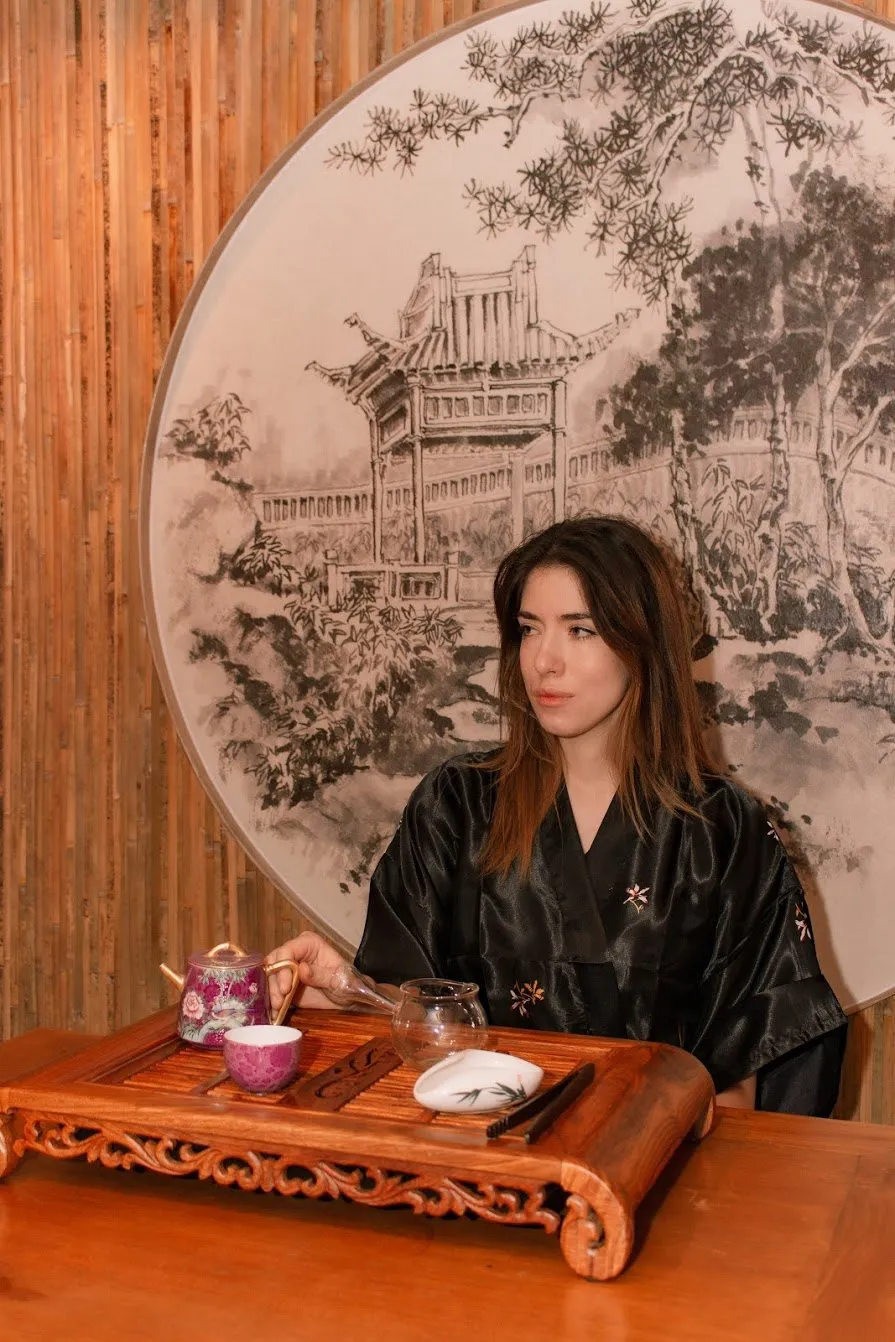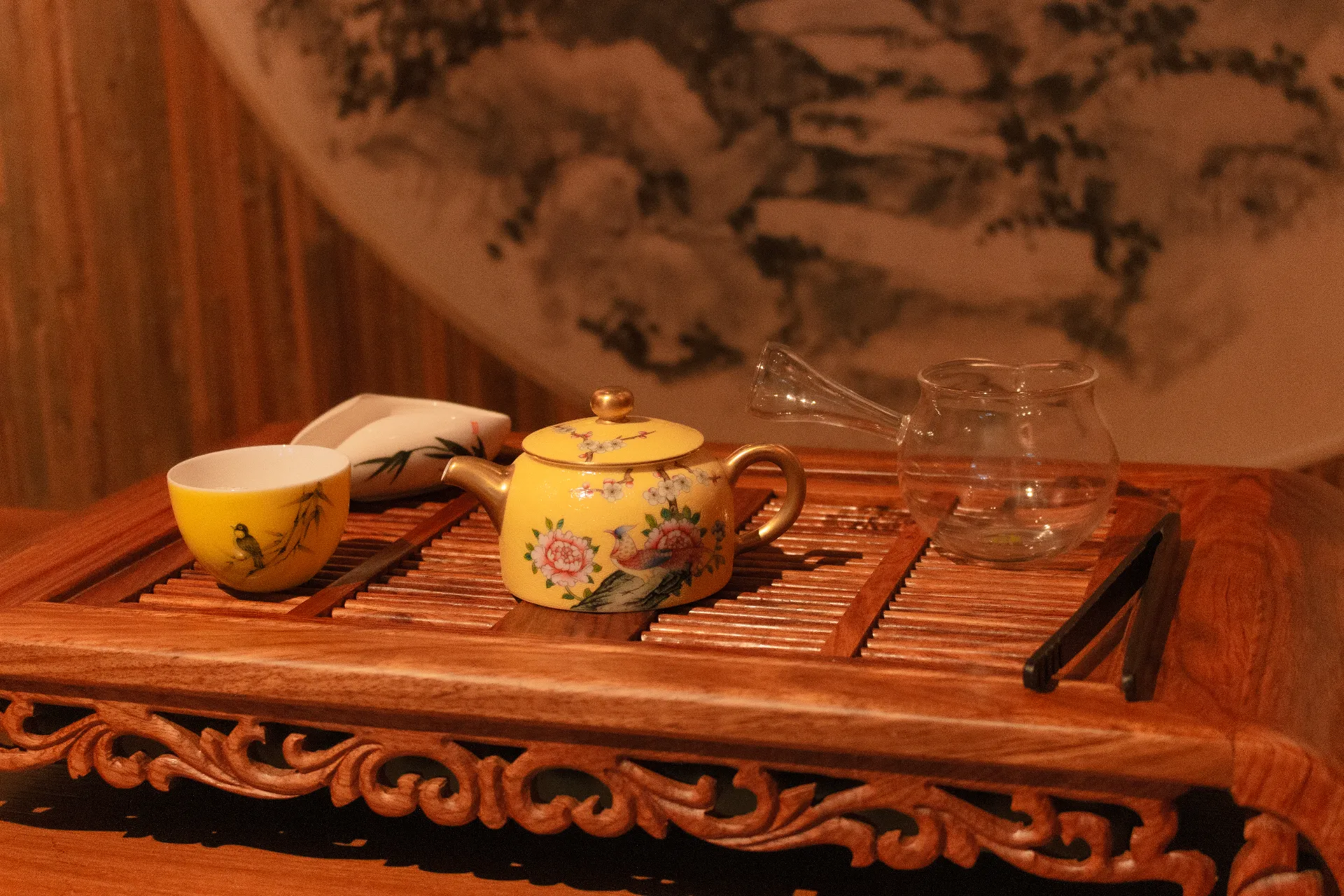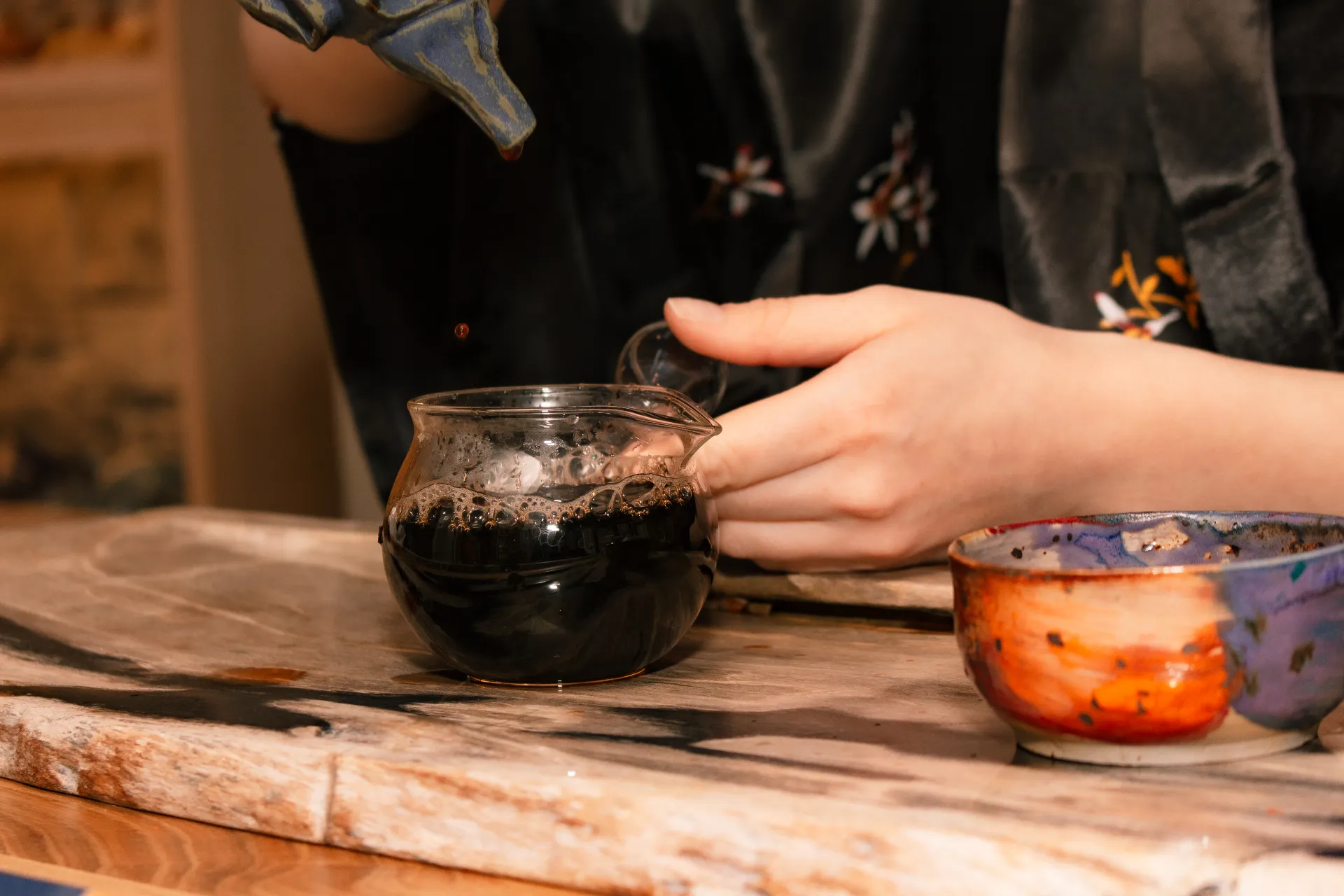In a world that constantly rushes forward, the simple act of preparing a cup of tea can be a revolutionary moment of peace. Many of us seek a deeper connection with this timeless beverage, moving beyond the tea bag to a more intentional practice. This is where the art of Gongfu Cha unfolds—a traditional Chinese tea ceremony that is not just about brewing tea, but about cultivating presence, skill, and appreciation. Translating to "making tea with skill," this practice transforms tea making into a meditative ritual, helping to create more balance in a modern lifestyle. At Moychay.nl, we are curators of this mindful experience, dedicated to providing "Ritual Makers" and "Tea Explorers" with everything needed to begin. Through this guide, we will explore the rich history, essential tools, and practical steps of Gongfu Cha, empowering you with the educational guidance to start your own mindful tea journey.

The Roots of Ritual: Philosophy and Origins of Gongfu Cha
To truly appreciate Gongfu Cha, we must understand its origins and philosophy. This ancient practice originated during the Ming Dynasty (1368–1644) as scholars and monks refined tea brewing into a precise ritual. The tradition flourished in the Qing Dynasty (1644–1911), particularly in the Fujian and Guangdong provinces, where the use of small teapots and multiple infusions became standard. During this period, Yixing clay teapots from Jiangsu gained prominence for their ability to enhance tea flavor over time.
The ceremony is guided by core philosophical principles rooted in three major Chinese traditions. Daoism emphasizes harmony with nature and simplicity, encouraging practitioners to be present and attuned to their environment. Confucianism expresses respect, hierarchy, and etiquette, fostering social harmony. Buddhism cultivates mindfulness and meditative focus during tea preparation and consumption. These principles are often summarized as He, Jing, Qing, Ji (和, 敬, 清, 寂)—harmony, respect, purity, and tranquility.
This aligns perfectly with Moychay.nl's mission of fostering a mindful tea lifestyle. The structured, deliberate actions of the ceremony help slow down the mind and anchor you in the now, a practice many people seek as a grounding ritual in their daily lives. While the tradition faced challenges during the Cultural Revolution (1966–1976), it experienced a revival in the late 20th century, becoming a celebrated aspect of Chinese tea culture worldwide. For those who feel the process might be intimidating, this short introduction can help demystify the beauty of the ceremony.
Assembling Your Altar: Essential Teaware for Gongfu Cha
A key part of the Gongfu Cha experience is the use of specific, functional teaware. Each piece is designed to enhance both the functional brewing process and the aesthetic pleasure of the ritual. As curators of the complete tea journey, Moychay.nl offers a selection of "Matching Teaware for Every Stage," from accessible porcelain to artisan-crafted pieces that bring authenticity to your practice. Here are the essential tools you will need.
The Gaiwan: A Versatile Brewing Vessel
The gaiwan, a lidded bowl, is often the heart of the ceremony. Its genius lies in its simplicity and versatility, consisting of a bowl, a lid, and a saucer. The lid is used to hold back the leaves while pouring and can be used to smell the aroma of the wet leaves. Typically made of porcelain or clay, gaiwans allow for precise control over steeping time and temperature. They are especially good for appreciating the evolving fragrance of oolong and other aromatic teas.
Discover our selection of porcelain and artisan gaiwans at the Moychay.nl Tea Shop
The Chaban (Tea Tray): Your Brewing Stage
The chaban, or tea tray, is a dedicated stage for your brewing. It is designed with a reservoir or a drainage tube to catch any spilled water and the discarded tea from the initial rinse. This practical tool keeps your brewing area clean and tidy, allowing you to focus on the movements of the ceremony without worrying about spills. It defines the ritual space, transforming any table into a tea altar.
Browse our functional and beautiful tea trays (chabans) here
The Gongdao Bei (Fairness Pitcher) & Teacups
The Gongdao Bei, or "fairness pitcher," is crucial for ensuring consistency. Tea is first poured from the gaiwan into the pitcher before being served. This step mixes the tea so that every person receives a cup with the exact same strength and flavor. From the fairness pitcher, the tea is decanted into small teacups. Their small size is intentional, encouraging you to savor the tea in concentrated sips, fully appreciating its complex aroma and lingering finish. Together with supporting tools like a tea scoop, filter, and tea towel, these items create a complete setup for a deep and rewarding practice.
Shop our full range of Gongfu teaware and accessories

The Dance of Tea: A Step-by-Step Gongfu Cha Ceremony
Gongfu Cha is a dance of elements—leaf, water, and teaware. The fundamental principle is using a higher ratio of tea leaves to water with short, multiple infusions. This method contrasts with Western tea brewing practices, which typically involve a single, longer infusion. The multiple short infusions allow the tea leaves to unfurl gradually, revealing a new layer of flavor and aroma with each steep. Many beginners are confused by this idea of re-steeping the same leaves, but it is the key to unlocking the tea's full potential.
Here is a comprehensive guide to performing the ceremony, drawing from traditional practices:
Preparation and Setting the Space: Find a quiet, uncluttered space. Arrange your chaban, gaiwan, fairness pitcher, cups, and other tools. Heat your water to the correct temperature for your chosen tea. Some practitioners begin by burning incense to purify the space and create a contemplative atmosphere.
Choose Your Tea: The soul of the ceremony is the tea itself. Oolong and Pu-erh teas are traditional choices, as their complex flavors develop beautifully over many infusions. Sourcing high-quality, farmer-direct leaves is essential for a good experience.
Explore our personally selected Oolong and Pu-erh teas
Presenting the Tea Leaves: Before brewing, present the dry tea leaves to your guests (or yourself). This allows appreciation of the tea's appearance, color, and dry aroma, setting the stage for the transformation to come.
Warming the Teaware (Wen Hu Wen Bei): Pour hot water into your gaiwan, fairness pitcher, and cups. This cleanses the vessels and preheats them so they don't cool down the tea. Discard this water into the chaban.
Awakening the Tea (Wen Run Cha): Add your tea leaves to the warmed gaiwan. Pour hot water over the leaves just enough to cover them, and then immediately discard the water. This first rinse "awakens" the leaves, releasing their initial fragrance. Take a moment to lift the gaiwan lid and inhale the rich aroma.
The First Infusion: Refill the gaiwan with hot water and steep for a short period (often just 10-30 seconds, depending on the tea). Pour the entire infusion into the fairness pitcher, then serve into the teacups.
Subsequent Infusions: For each following steep, you can gradually increase the infusion time. Notice how the flavor, color, and aroma of the tea changes with each round. A good quality tea can yield anywhere from 5 to over 10 infusions.
Serving and Enjoying: Serve the tea to your guests or enjoy it yourself, taking time to engage all your senses. The ceremony is as much about the shared experience and mindful appreciation as it is about the taste.
Modern Adaptations and Global Influence
The transformation of Gongfu Cha has continued into modern times. In the 1970s and 80s, Taiwanese tea enthusiasts established "Chayiguan" (茶艺馆), or tea art houses, promoting a tranquil atmosphere for tea appreciation. This movement contributed to the global spread of Gongfu Cha, influencing modern tea practices worldwide. Today, practitioners around the world have adapted the ceremony to fit their lifestyles while maintaining its essential spirit of mindfulness and respect for the tea.
This flexibility reflects the ceremony's core philosophy—it's not about rigid adherence to every step, but about creating space for mindful connection with tea. Whether you follow a traditional 21-step ceremony or a simplified 13-step approach, the essence remains the same: taking time to appreciate the journey from leaf to cup.

Beyond Brewing: Cultivating Presence and Mindfulness
While the steps of Gongfu Cha provide a structure, its true essence lies beyond the mechanics of brewing. It is an active meditation, a dedicated time to disconnect from digital distractions and reconnect with yourself. The ceremony invites deep sensory engagement—listening to the sound of water pouring, watching the leaves unfurl, inhaling the developing aroma, and tasting the subtleties in each cup.
This practice demonstrates that tea can be more than a simple convenience; it can be a profound ritual that serves as an anchor during times of stress or uncertainty. Many practitioners find that creating "gentle rituals" like a weekly tea ceremony provides structure and comfort, especially during challenging periods. The repetitive, meditative actions of brewing can help center the mind and provide stability when life feels chaotic.
My life philosophy is simple - tea is worth spending time on. Take your time... Enjoy life.
This philosophy resonates with those seeking to find pockets of peace in their day. By creating a personal sanctuary at home—even a small corner of a desk—you can integrate this practice into your daily life. It becomes a consistent moment to foster self-awareness, reduce stress, and live with more intention. This is the heart of Moychay's mission: using "Mindful Product Curation" to support a way of living with more presence, one cup at a time.
Moychay's Mission and Values
At Moychay.nl, our dedication goes beyond simply selling tea—we are committed to sourcing authentic, high-quality teas from renowned tea-growing regions across China, Taiwan, Japan, and beyond. Our mission centers on preserving tea culture while educating customers about the rich traditions and mindful practices surrounding this ancient beverage. Every tea in our collection is personally selected by our founder, Sergey Shevelev, ensuring that each leaf meets our exacting standards for quality, authenticity, and cultural significance.
We believe that tea culture is not just about consumption but about connection—to the land where the tea grows, to the farmers who cultivate it, and to the centuries-old traditions that guide its preparation. Through our carefully curated selection and educational guidance, we aim to bridge the gap between traditional tea culture and modern mindful living, making these practices accessible to everyone in the Netherlands and throughout Europe.
Explore our personally selected tea collection
Explore Our Tea Selection
Our tea selection represents a journey through the most celebrated tea-growing regions of Asia. From the delicate, grassy notes of Japanese sencha and the ceremonial richness of matcha to the complex, evolving flavors of Chinese oolongs and the deep, earthy character of aged pu-erh, each tea tells a story of its origin and craftsmanship.
Our green teas capture the fresh vitality of spring, offering bright, clean flavors that invigorate the senses. The black teas in our collection provide robust, warming comfort with their malty sweetness and full-bodied character. Our oolong selection showcases the artistry of partial oxidation, creating teas that dance between green and black, offering floral, fruity, and roasted notes that develop beautifully through multiple infusions. The pu-erh teas represent time itself—some young and vibrant, others aged for decades, developing complex, wine-like characteristics that speak to the patience and wisdom of traditional tea culture.
Each tea comes with detailed tasting notes, brewing instructions, and stories about its origin, helping you develop a deeper appreciation for the craft and culture behind every cup. We believe that understanding your tea enhances the entire experience, transforming a simple beverage into a moment of connection and mindfulness.
Discover our Pu-erh and Oolong collections
Teaware and Accessories
The right teaware can transform your tea experience from ordinary to extraordinary. Our collection of teaware and accessories reflects the same commitment to authenticity and quality that defines our tea selection. From traditional Yixing clay teapots that develop character with each use to delicate porcelain gaiwans that showcase the color and clarity of your tea, every piece is chosen for both its functional excellence and aesthetic beauty.
Our artisan teapots are crafted by skilled potters who understand the relationship between clay, tea, and time. These pieces not only brew exceptional tea but also become cherished companions in your tea journey, developing a unique patina and character through regular use. The tea cups in our collection are designed to enhance the sensory experience—their size, shape, and material all contribute to how you perceive aroma, temperature, and flavor.
Beyond the essential brewing vessels, we offer a complete range of accessories including tea trays (chabans), bamboo tools, filters, and storage solutions that help create the perfect environment for mindful tea preparation. Each piece serves a specific purpose in the tea ceremony while contributing to the overall aesthetic and ritualistic experience.
Browse our Yixing teapots and traditional teaware
Seamless Online Shopping
Shopping at Moychay.nl is designed to be as mindful and intentional as the tea culture we promote. Our website features intuitive navigation that allows you to explore teas by origin, type, or flavor profile, making it easy to discover new favorites or find exactly what you're seeking. Each product page includes comprehensive descriptions, brewing guidelines, and detailed photography that brings you closer to the tea before it arrives at your door.
We understand that buying tea online requires trust, which is why we provide extensive information about each tea's origin, processing methods, and flavor characteristics. Our detailed product descriptions help you make informed choices, whether you're a seasoned tea enthusiast or just beginning your journey into mindful tea culture.
Our reliable delivery service ensures that your carefully selected teas and teaware arrive safely throughout the Netherlands and across Europe. We package each order with care, protecting delicate items and preserving the freshness of our teas. Fast, secure shipping means you can begin or continue your tea journey without delay, bringing the tranquility and mindfulness of tea culture directly to your home.
Start your mindful tea journey at Moychay.nl

Conclusion: Your Journey with Mindful Tea
Gongfu Cha is a transformative practice that offers a pathway to a deeper connection with both tea and your inner self. From its philosophical roots in Daoist harmony and Confucian respect to the beautiful dance of its essential tools, the ceremony is a celebration of skill, presence, and sensory appreciation. It demystifies the art of brewing, turning a simple beverage into a rich, meditative experience. This journey is one of continuous learning and discovery, and it doesn't have to be undertaken alone.
At Tea Culture Club Moychay.nl, we are committed to being your trusted guide at every stage. We provide "Complete Tea Journey Support" by offering everything from "Personally Selected Loose Leaf Tea" ideal for Gongfu Cha to the "Matching Teaware" like artisan gaiwans and chabans needed for an authentic setup. With our "Educational Guidance & Brewing Tips," we empower you to brew with confidence. We encourage you to embrace this beautiful ritual, to slow down, and to discover the tranquility that lies within a simple cup of tea.
Begin your mindful tea journey today at the Moychay.nl online shop
For a truly immersive experience, we invite you to visit the Moychay.nl Tea Bar & Tea House in Amsterdam at Rozengracht 92H. Allow our knowledgeable staff to guide you through a traditional ceremony and discover a world of flavor and tranquility.





